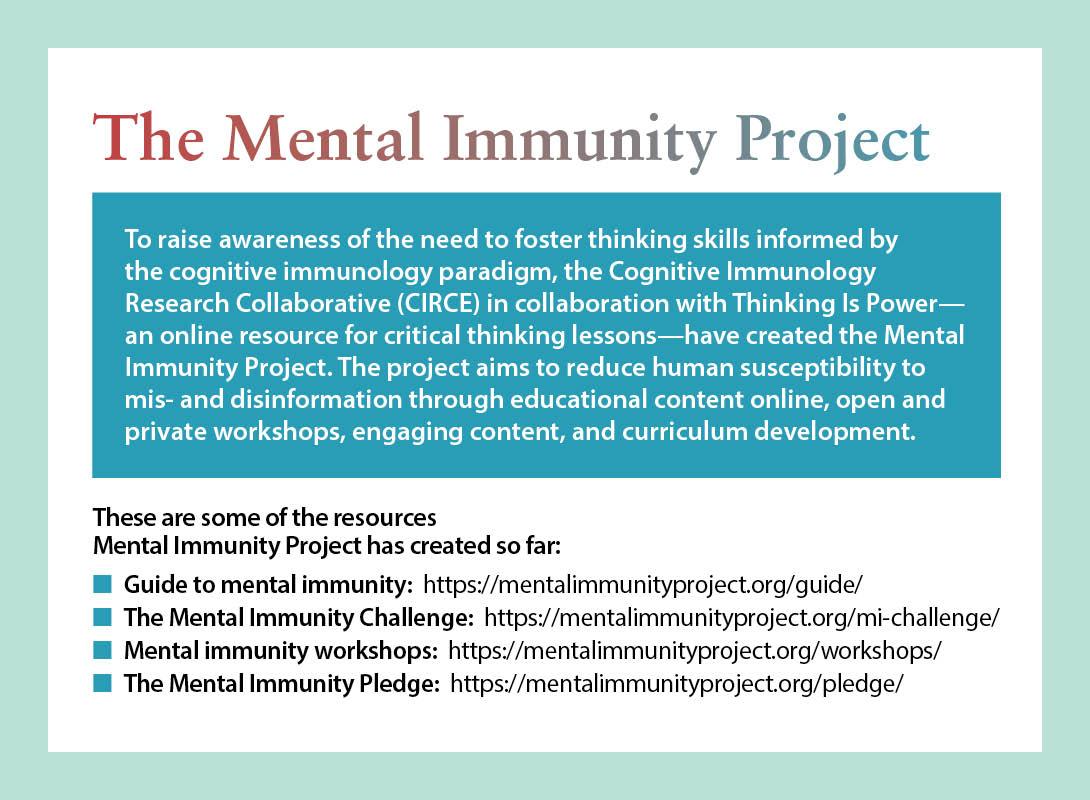The Critical Importance of Cognitive Immunology
Just as pathogens can infect bodies, spread to other bodies and make us sick, bad ideas can infect our minds, spread to other minds and disrupt our thinking. Minds can fall prey to infectious and disruptive ideas. This has happened throughout history. From witch trials in colonial America to human sacrifice in the Aztec empire to the rise and spread of national socialism in the 1930s, human history is rich with examples of harmful ideas capturing human minds and spreading misery.
Thankfully, human minds can acquire resistance to infectious and disruptive ideas in much the way that animal bodies acquire resistance to infectious and disruptive microbes.
The fledgling field of infodemiology applies the tools of epidemiology to model the diffusion of misinformation. A related discipline applies the language of immunology to better understand how minds filter information. Because this filtration is strikingly similar to bodily immune function, we call this discipline “cognitive immunology.” We think it represents a significant paradigm change in cognitive science, one that integrates prior research on psychological inoculation, cognitive biases, belief change and other concepts.
If minds really do have immune systems, we need to consider the way we understand, educate and care for them, which is certain to have important policy implications. Herein we lay out the empirical and theoretical foundations of cognitive immunology, identify the implicated policy areas and make recommendations based on the science.

Research confirms that it is far easier to prevent the spread of false information than it is to change minds that have already fallen for it.
The Foundations of Cognitive Immunology
Cognitive immunology (CI) is an emerging branch of cognitive science that has its roots in inoculation theory, infodemiology, Socratic questioning and other areas of cognitive science. CI merges these areas of research with findings about cognitive biases, identity-protective cognition and critical thinking, yielding a picture of the human mind as having informational “immune systems'' that function more or less well. The model applies to both individual minds and communities of networked minds: both have informational defenses that need to be understood and strengthened. Just as the body’s immune system protects against problematic microbes, cognitive immune systems protect minds from problematic information, beliefs and meta-beliefs.
Inoculation research demonstrates that the mind can be inoculated from misinformation. Cognitive immunology expands on this model by likening questions and doubts to the mind’s antibodies. This model can be used as a powerful framework for educational resources and tools designed to strengthen cognitive immune systems (See related graphic). While questions remain about the conceptual underpinnings of the model, it’s already clear that CI has a rich set of policy implications. In what follows, we detail several.
Understanding the Policy Implications of Cognitive Immunology
Recent decades have transformed the information ecosystem to which our minds must adapt. Misinformation, disinformation, conspiracy “rabbit holes,” toxic ideologies: information hazards are always just a click or two away. These hazards can have exorbitant downstream costs, misinformed populations, poorly educated youth, the erosion of democratic institutions, political polarization and extremism, the rapid escalation of polarized conflict, the poisoning of political discourse: all these problems are rooted in our susceptibility to sketchy information. Cognitive immunology-informed interventions promise to reduce susceptibility to misinformation and bad ideas (i.e., ideas that are misleading, manipulative or harmful).
Inoculation theorists have created gamified interventions that are effective in making people less susceptible to misinformation. Moreover, a recent review of 42 scientific papers by 26 misinformation researchers deduced 10 types of effective interventions for countering misinformation (one of these 10 being inoculation), which are all compatible with the CI model. In targeting the root causes of misinformed beliefs, these interventions can be thought of as a toolbox of cognitive immunity enhancers. We are only just beginning to see these sorts of tools put to use. Further development of cognitive immunology interventions could significantly mitigate societal dysfunctions arising from belief in misinformation and bad ideas.
There are “top-down” and “bottom-up” approaches to cleaning up information environments. Because top-down approaches can easily become Orwellian, public policy must focus, for the most part, on noncoercive, bottom-up interventions, that is, those that build cognitive resilience: the ability to spot and shed information that is misleading, manipulative or otherwise harmful. CI provides a scientific basis for enhancing the information processing skills of information consumers. We see this as a high-leverage approach to preventing infodemics and promoting the well-being of citizens everywhere.
And the research confirms that it is far easier to prevent the spread of false information than it is to change minds that have already fallen for it.
The CI model suggests that for policymakers to improve the conditions of our information ecosystem and address the downstream problems, they must enact policy that strengthens cognitive immune systems, including both the critical thinking skills of citizens and the tools available to them for processing information. The areas of public policy most clearly implicated in this are education, public health and communications. CI-informed policies in these areas can help foster peace and national security, social cooperation, public health and democratic functioning.
Policy Recommendations
We recommend that policymakers:
- Introduce CI-informed programming into school curricula with the aim of equipping a new generation of critical thinkers.
- Introduce CI-informed programming into journalism programs to better equip the next generation of reporters and media gatekeepers.
- Leverage our growing understanding of the mind’s immune system to develop healthier online environments: environments that promote reflection, dialogue and community- building. This work needs to be done in collaboration with social media companies and information technologists.
Invest in the science, particularly the branch of cognitive immunology that seeks to identify interventions that confer broad immunity to the most pernicious kinds of information: extremism, anti-democratic ideologies, demagoguery, conspiratorial thinking, etc.
Luke Johnson is the director of operations for the Cognitive Immunology Research Collaborative, known as CIRCE, and is part of the Mental Immunity Project Team. Andy Norman is the executive director of CIRCE.






Comments